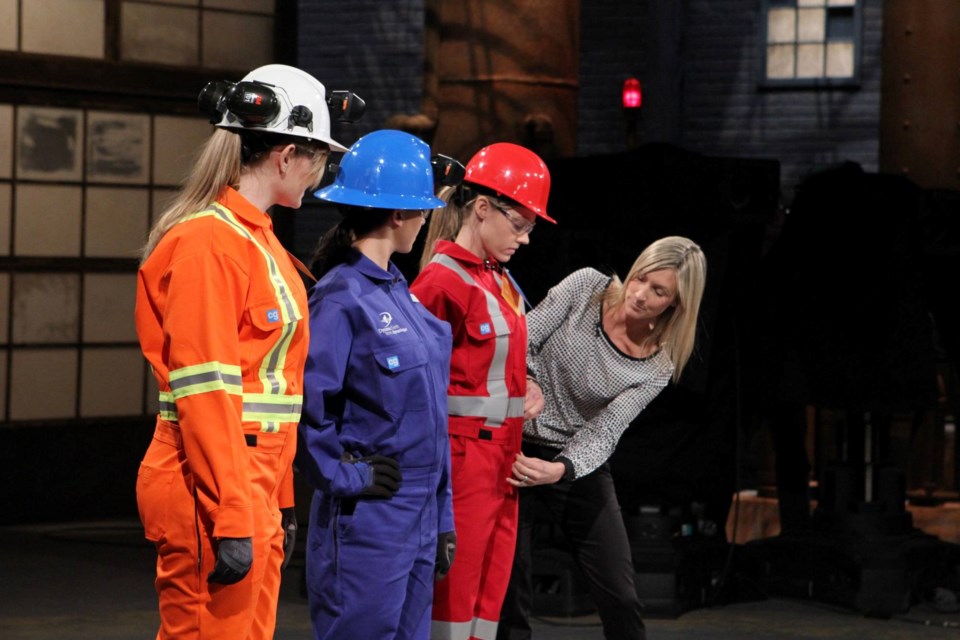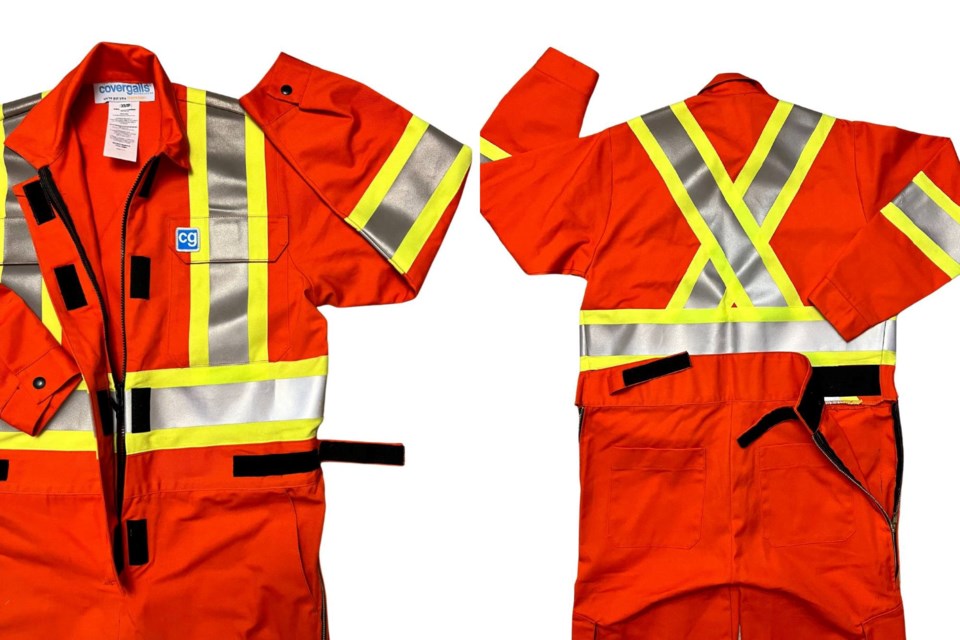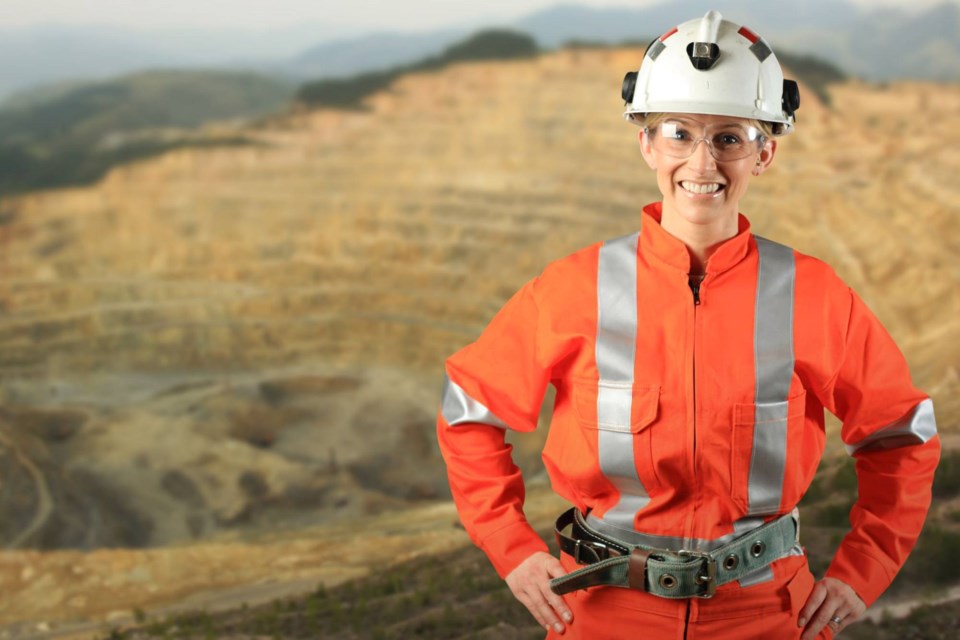Alicia Woods has come full circle.
Ten years after first appearing on Dragons’ Den, the founder and CEO of Covergalls has made her third appearance on the CBC business pitch-style show to share just how far her women’s workwear company has come.
“It’s pretty exciting, because for us it was an opportunity, almost like coming full circle, to be able to come back and show the progress that we've made since being in the den,” she said of being asked to appear on the Feb. 1 episode.
“But also, two Dragons in particular had given us advice, so it was an opportunity to also thank them for giving that advice… and what impact it had on our business.”
Woods first pitched the Dragons in Season 9.
It was October 2014, and she was riding high on the excitement of just having secured an order for 50 pairs of Covergalls from the nickel miner Vale.
Designed for a woman’s physique, Woods’ coverall includes features that men’s covergalls don’t: a two-way zipper, velcro tabs around the waist, and a rear trap door to make going to the bathroom easier.
By creating a properly fitting coverall — rather than just shrinking down a men’s version — women would have a safer, more comfortable option for on-the-job workwear, reasoned Woods, a veteran of the mining industry.
In her original pitch, Woods sought a $75,000 investment for a 20 per cent share of her company.
Three Dragons — Arlene Dickinson, Jim Treliving, and Michael Wekerle — jumped at the chance to get in on the deal with the fledgling garment-maker, negotiating $75,000 for a 30 per cent stake.
But following due diligence, Woods said, the offer didn’t go through, and she retains full ownership of the company today.
At the time, Woods believed securing investment capital and mentorship from the Dragons would be the keys to growing the business. But the experience yielded “far more than I could have ever imagined,” she said.
A big factor was hearing the Dragons’ support for her product, which boosted her confidence.
“I made the Covergall for me; it was born out of my own frustration having to wear men’s workwear,” she said. “I thought it was the greatest thing, but just (receiving) that validation that I wasn’t the only one who saw a need for this product.”

They also sparked an idea: coveralls for women could have applications beyond the mining industry. Women also needed appropriate workwear for their roles in construction, oil and gas, the trades, forestry, and the utilities industries, noted Dickinson.
With that little tip, Woods was starting to see a bigger picture emerge.
Later that year, she returned for the season finale, which featured a trip with Wekerle underground at Vale’s Coleman Mine. By 2019, she had left full-time work in the mining industry to solely concentrate on Covergalls.
Much has changed since then.
Covergalls has matured beyond the original coverall to include a complete product line of workwear for women, including pants, shirts, and bib overalls.
In 2022, the company created a high-visibility T-shirt made with recycled water bottles, in partnership with Waste2Wear, and the following year introduced a maternity line for expectant women.
This winter, the company released the Covergall 2.0, an updated version of its original coverall that’s been tweaked with feedback from women in the industry.
“The Covergall worked for me, it was designed for me, but it doesn’t necessarily mean that it’s going to work for everybody else out there,” Woods said.
So she consulted with women from the mining industry, had them try on the garment, test out the features and give input as to what they’d like to see.
“The reality is, if we don’t receive this feedback, how do we know? We’ll just assume that it’s great,” Woods said. “So we encourage women to come forward with their feedback or suggestions.”
An enhanced rear trap door, hidden pockets for sanitary items, cargo pockets, and zippers at the ankles are all included on the new Covergall, the bib overalls and the cargo pants, the latter of which will also feature an adjustable waistband.
Manufacturing remains in Canada and the list of major companies and distributors carrying Covergalls continues to grow.
Priorities for the company in 2024 include expanding its sustainable product offering and introducing an inclusive workwear line.
“We’re actually working with some companies right now to outfit their entire workforce to make sure that they’re safely and properly outfitted in workwear,” Woods said. “We get a lot of feedback from men, too, who want to see improvements overall to workwear.”

She’s also eyeing the U.S. market, actively entertaining export opportunities through new distribution channels and existing partnerships with mining companies that have global operations.
All this is pushing Covergalls toward annual sales of $1 million.
As with each of Woods’ appearances on Dragons’ Den, this most recent episode has sparked an uptick in activity around the company — new sales, increased social media chatter, and interest in her company’s origin story.
She’s regularly tapped to attend various entrepreneurship and women-in-the-trades events as a guest speaker where people are often hearing her story, and the idea behind Covergalls, for the first time.
Woods is happy to educate them.
“This is not about fashion,” she said. “This is about safety; this is about health; this is about inclusivity, making people feel like they belong in their respective workplaces and in the jobs that they're doing.
“This is far beyond just a garment that people put on every day to go to work.”




